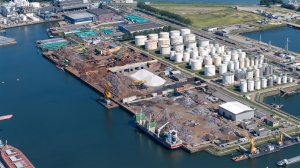


(Posted on 15/03/24)
Different product processes, non-fossil raw materials and rare materials are crucial for a CO2-neutral, circular society. What role can the port of Rotterdam play in the raw material transition and which choices have to be made to achieve that? Those are the central questions in recent DRIFT research, commissioned by the Port of Rotterdam Authority. The result of this collaboration is The raw material transition for the Port of Rotterdam report.
The report advocates a radical change in the import flows and industry in the port. The raw material transition is a precondition for the success of the energy transition worldwide and for the future of the port of Rotterdam. At the same time, it forms the precursor to a circular economy that is now very much in development, but which is essential if the earth's resources are not to be further exhausted. Not only that, but making and recycling products contributes in this context to Europe's strategic autonomy. One conclusion of the research is that the circular economy needs more physical space for the collection and separation of all residual and waste flows for processing into new products. According to the research, this means that it is necessary to look beyond the current port area.
Prof. Jan Rotmans MA MSc., founder of DRIFT: ‘The raw material transition is crucial to the energy transition, for the world, for Europe, for the Netherlands and for the port of Rotterdam. As yet, the circular economy forms only 7% of the real economy worldwide. If the port of Rotterdam wants to become circular, more space is needed for the processing of all the residual and waste flows. That will mean judicious decision-making for the future.’
Boudewijn Siemons, CEO of Port of Rotterdam Authority: ‘The energy transition is beginning to take shape and the next step is to consolidate the raw material transition. There are already very promising activities in recycling and the port of Rotterdam has the largest cluster of biofuels in Europe. At present, extra biorefineries are being built in Rotterdam that produce on the basis of organic materials and residual products. We need to further expand this and scale it up. For that reason, we are developing a raw material strategy this year, for which this research offers valuable guidelines.’
The research focuses on three major product chains: critical raw materials, chemicals and building materials. Critical raw materials are those currently often imported and used in small quantities in Europe but that are essential for all sorts of technologies. Multiple quantities are needed for the energy transition. The European Critical Raw Materials Act sets goals for 2030 for the percentage of raw materials that must come from Europe itself (10%), the processing capacity (40%) and recycling (15%). Many materials must be imported from other parts of the world which now mainly supply to other countries, in particular China. The report recommends that Rotterdam take a leading role in raw material diplomacy, aimed at bilateral collaboration. And it is important that more businesses which recycle and process those critical raw materials are established in or around the port.
Scaling up industry which processes that waste (also plastic) into new products is essential. The raw materials in the chemicals industry are now often based on crude oil and other fossil sources. That has to change. It requires a fundamental change to the system and new value chains of other raw materials. Other advice in the report is to build a network and infrastructure in the current "hinterland" of North West Europe, to recover materials. That will mean new input, such as pyrolysis oil from used plastic.
Constructing with concrete and steel requires a lot of energy and leads to high emissions of CO2. Constructing with bio-based materials such as wood is a good alternative. Fundamental changes in the raw materials chain are needed, from countries of production to the processing industry. Rotterdam can play a role in the import of wood as a building material.
Setting up new value chains of raw and other materials requires making choices; which activities should scale up, which will disappear and what does all that mean for the existing value chains? How should the scarce space be distributed? This research gives guidelines for the raw materials strategy that the Port of Rotterdam Authority is in the process of developing. The strategy is scheduled to be completed this year.
Trafigura Group Pte Ltd, a global leader in the commodities industry, has announced its financial results... Read more
Rio Tinto has successfully produced the first copper from the Johnson Camp mine in Arizona using its... Read more
The American Soybean Association’s World Initiative for Soy in Human Health programme and the... Read more
Karlka Nyiyaparli Aboriginal Corporation (KNAC) Registered Native Title Body Corporate and Rio Tinto... Read more
OCI Global, a leading global producer and distributor of nitrogen products has announced that it has... Read more
In December 2024, SSAB was granted a permit by the Land and Environment Court at Umeå District... Read more
The President of the Republic of Guinea has joined project partners WCS1, Baowu, Chinalco and Rio Tinto... Read more
GSC (Global Strategic Commodities) has announced the launch of its dedicated mining advisory division... Read more
SSAB AB has successfully issued its inaugural green bonds under its EUR 2 billion EMTN programme, dated... Read more
On 9 September 2025, Anglo American plc and Teck Resources Limited announced that they had reached an... Read more